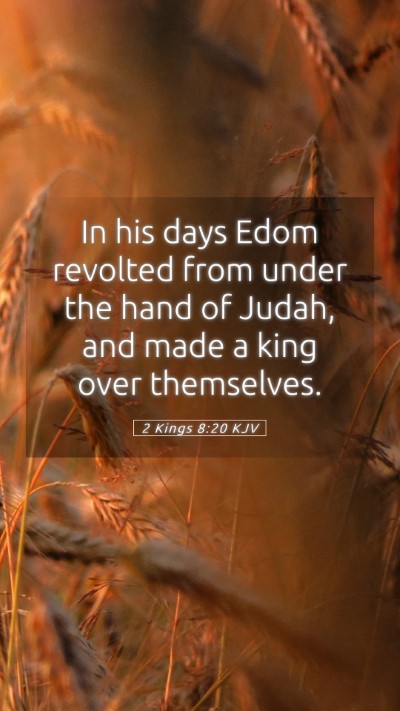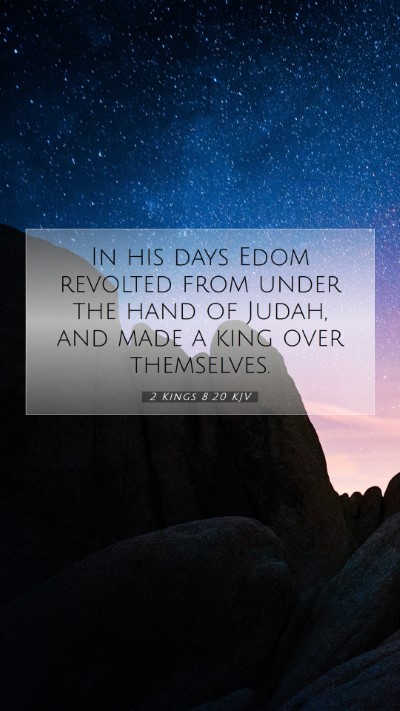Understanding 2 Kings 8:20
Bible Verse: 2 Kings 8:20 - "In his days, Edom revolted from under the hand of Judah, and made a king over themselves."
This verse marks a significant historical moment in the kingdom of Judah, encapsulating themes of conflict, rebellion, and political change. Below is a comprehensive analysis combined from public domain commentaries, aimed at providing a deeper insight into its meaning.
General Overview
2 Kings 8:20 describes the revolt of Edom against the control of Judah during the reign of King Joram (also referred to as Jehoram). This event is pivotal in understanding the tumultuous relationships among the kingdoms of Israel and Judah and their neighboring nations.
Biblical Context and Historical Significance
According to Matthew Henry, the revolt of Edom signifies a crucial turning point in the political dynamics of the region, as it reflects the growing weakness of Judah’s influence. Albert Barnes remarks that the Edomite insurrection indicates a desire for independence, which can be attributed to both internal strife within Judah and the external pressures of neighboring powers.
Furthermore, Adam Clarke notes that this revolt emphasizes the fragile nature of political power in ancient times. The emergence of an independent king in Edom illustrates the instability in Judah's rule and foreshadows further challenges to the monarchy's authority.
Key Themes and Insights
- Political Rebellion: The revolt represents not just Edom’s quest for autonomy but also metaphorically speaks to the failures of leadership in Judah.
- National Identity: This rebellion can be seen as a quest for national identity by Edom. As the kingdom sought to establish its own leadership, it highlights the struggles of subjugated nations.
- Divine Sovereignty: The events in this verse prompt readers to reflect on the overarching theme of God’s sovereignty amidst human affairs. Despite the rebellion, God remains in control of the broader narrative of salvation history.
Commentary Insights
Matthew Henry emphasizes that the revolt against Judah is a reflection of Divine judgment due to the unfaithfulness of its rulers. He notes that the loss of Edom symbolizes a significant moral and spiritual decline in the kingdom of Judah.
Albert Barnes provides an insightful interpretation that stresses the political implications of this rebellion. He argues that the revolt can be seen as a direct consequence of King Joram’s ineffective rule, lacking the leadership qualities necessary to maintain peace and control over the vassal states.
Adam Clarke elaborates on the significance of the revolt from both a historical and theological perspective, suggesting that it reflects the broader social and political upheaval occurring in the region as a result of declining faith and morality.
Application and Understanding
For contemporary readers, 2 Kings 8:20 serves as a reminder of the consequences of poor leadership and moral decay. It prompts believers to consider the importance of righteous governance both in their personal lives and within their communities. The desire for autonomy and identity is still relevant today, as nations and individuals seek recognition and respect.
Cross References
- 2 Chronicles 21:8-10 – Discusses the same event in greater detail.
- Genesis 36:31 – Provides background information on the kings of Edom.
- 1 Kings 11:14-22 – Explains the historical context of Edom's relationship with Judah.
Conclusion
Understanding 2 Kings 8:20 through the lens of Scripture analysis and biblical exegesis provides invaluable insights into the interconnectedness of ancient kingdoms as well as the timeless truths regarding leadership and faithfulness to God. For those engaging in Bible studies, whether in groups or individually, this verse offers a wealth of material for reflection and discussion.
In-depth exploration of such passages using Bible study tools and resources can greatly enhance one's understanding of Scripture and its applications to daily life.


